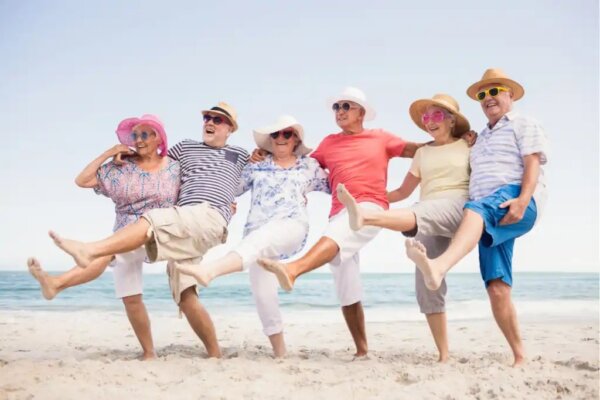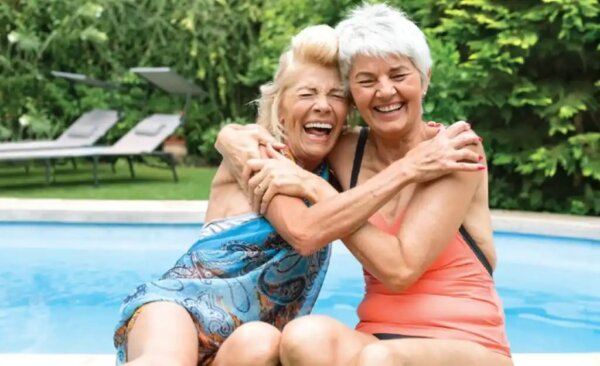The Importance of Third-Age Friendships


Written and verified by the psychologist Valeria Sabater
Third-age friendships are indispensable, as they boost well-being. In fact, at this age, social bonds can be as vital as they are in the teenage years. Company, stimulation, confidence, affection, and closeness are necessary nutrients for the elderly.
One of the biggest problems among older people is social isolation. Being lonely, sick, or tied to the home depresses them and shuts them off from life. Furthermore, we tend to assume that old age and loneliness go hand in hand.
Often, an elderly person who’s just lost their spouse is told that they just have to put up with it. This perspective that loneliness is a part of being old is a form of discrimination and cultural distortion that should be corrected. In fact, having a good quality of life at any age is a human right and unwanted loneliness isn’t something that anyone should have to get used to.
Tennessee Williams said that life is, in part, made by the friends we choose. Having friends gives your life meaning, momentum, and importance. This is essential at any age.

Third-age friendships are more effective than medicine
As you mature and go through life, you learn a lot about friendship. For this reason, you don’t define a friend in the same way at 20 as you do at 60. You learn about people and relationships and discover who deserves your affection and who you choose to leave behind. In fact, you become more selective and tend to know exactly what you want.
The elderly tend to be defined as having a limited or less accessible family network. As well as possibly having lost spouses, they may not live close to their children or grandchildren. Social isolation is the shadow that hangs over the elderly and can only be resolved in one way: friendship.
We often talk about the importance of neighbors and social services for the elderly. However, these relationships aren’t emotionally significant. Indeed, while social care is useful, it isn’t on the same level as friendship.
Friendship in the elderly must be close, worthwhile, and meaningful to have a real impact.
Bonds of friendship improve mental health more than bonds with relatives
The gerontology department at Carolina University (USA) conducted a study that confirmed that friendships play a vital role in the elderly. This is because friends can have a stronger impact on psychological well-being than the company of certain relatives.
While a parent loves their children and grandchildren, they don’t always rely on them on a daily basis. However, having a circle of friends means socializing, getting out of the house, having shared interests, and sharing worries, joys, and confidence, etc.
These everyday life dynamics stimulate the brain and inject positive emotions. For this reason, friendship in the elderly is almost as indispensable as their relationship with their family.
Friendship equals independence, which equals well-being
Reaching the third age doesn’t mean that you have to give up on your hopes and dreams. A few wrinkles don’t take away the desire for new experiences. However, gerontophobia and the prejudices that surround the elderly have a tendency to negatively distort their image.
Unfortunately, many elderly people’s social needs are unmet. This can lead them to isolation, depression, and existential dissatisfaction. Nevertheless, the entire situation can be turned around if they have meaningful and stimulating friendships.
As a matter of fact, this stage of life can be a period when people enjoy themselves more than ever. The company of others of the same age can encourage them to take on new interests. Indeed, in many cases, they manage to do things they could’ve never done when they were younger due to all types of constraints.

Women enjoy their third-age friendships a lot more
It’s easy to understand why elderly women enjoy their friendships a lot more. On average, females have a higher life expectancy. For this reason, they’re more likely to end up living alone. Consequently, having the company of others and friends of their own age has a direct positive impact on their physical and psychological health.
We define friendship in the elderly by the kind of relationships that are companionable and satisfying in everyday life. However, society needs to facilitate these kinds of relationships.
In fact, the community should have available spaces for seniors to meet together. It should also provide activities for them to enjoy, both in the long and short term. In a society with an ever-increasing amount of elderly people, we need social changes that reflect this fact.
All cited sources were thoroughly reviewed by our team to ensure their quality, reliability, currency, and validity. The bibliography of this article was considered reliable and of academic or scientific accuracy.
-
Adams, R. G. (1983). Friendship and its role in the lives of elderly women. (Doctoral Dissertation). Department of Sociology, University of Chicago
-
Adams, R. G. (1985). People would talk: Normative barriers to cross-sex friendships for elderly women. The Gerontologist, 25(6), 605–611
- Adams, Rebecca & Blieszner, Rosemary & Devries, Brian. (2000). Definitions of friendship in the third age: Age, gender, and study location effects. Journal of Aging Studies. 14. 117-133. 10.1016/S0890-4065(00)80019-5.
- Blieszner, R., Ogletree, A. M., & Adams, R. G. (2019). Friendship in Later Life: A Research Agenda. Innovation in aging, 3(1), igz005. https://doi.org/10.1093/geroni/igz005
This text is provided for informational purposes only and does not replace consultation with a professional. If in doubt, consult your specialist.








